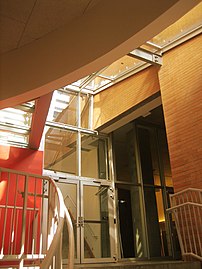Yesterday I was privileged to be invited to give a talk at the NESTA Crucible Workshop being held in Lancaster. You can find the slides on slideshare. NESTA, the National Endowment for Science, Technology, and the Arts,Â
In a week or so’s time I have been invited to speak as part of a forward planning exercise at Elsevier. To some this may seem like an opportunity to go in for an all guns blazing OA rant or perhaps to plant some incendiary device but I see it more as opportunity to nudge, perhaps cajole, a big player in the area of scholarly publishing in the right direction.

All good traditions require someone to make an arbitrary decision to do something again. Last year I threw up a few New Year’s resolutions in the hours before NYE in the UK. Last night I was out on the shore of Sydney Harbour. I had the laptop – I thought about writing something – and then I thought – nah I can just lie here and look at the pretty lights.
Yesterday on the train I had a most remarkable experience of synchronicity. I had been at the RIN workshop on the costs of scholarly publishing (more on that later) in London and was heading of to Oxford for a group dinner. On the train I was looking for a seat with a desk and took one up opposite a guy with a slightly battered looking mac laptop.
The third installment of the paper (first part, second part) where I discuss social issues around practicing more Open Science. Scientists are inherently rather conservative in their adoption of new approaches and tools. A conservative approach has served the community well in the process of sifting ideas and claims;

I had been getting puzzled for a while as to why I was being characterised as an ‘Open Access’ advocate. I mean, I do adovcate Open Access publication and I have opinions on the Green versus Gold debate. I am trying to get more of my publications into Open Access journals. But I’m no expert, and I’ve certainly been around this community for a much shorter time and know a lot less about the detail than many other people.
So BioBarCamp started yesterday with a bang and a great kick off. Not only did we somehow manage to start early we were consistently running ahead of schedule. With several hours initially scheduled for introductions this actually went pretty quick, although it was quite comprehensive.

One of the strong messages that came back from the workshop we held at the BioSysBio meeting was that protocols and standards of behaviour were something that people would appreciate having available. There are many potential issues that are raised by the idea of a ‘charter’ or ‘protocol’ for open science but these are definitely things that are worth talking about.

Perimeter Institute by hungryhungrypixels (Picture found by Zemanta). Sabine Hossenfelder and Michael Nielsen of the Perimeter Institute for Theoretical Physics are organising a conference called ‘Science in the 21st Century‘ which was inspired in part by SciBarCamp.
Ok, having flagged up two surveys in my previous post I have now done the second one. It seems to be for anyone worldwide but I wanted to bring it to people’s attention because it further clouds the definition of Open Access, whether deliberately or through ignorance I can’t say. Fairly early on we have the following question: BBB doesn’t seem to even exist as an option! And then in the following panel;